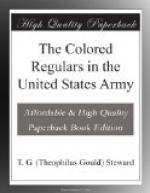The Tenth Calvary was organized under the same law as was the Ninth, and at the same time. Its place of rendezvous was Fort Leavenworth, Kansas, and its first Colonel, Benjamin H. Grierson. This regiment was the backbone of the Geronimo campaign force, and it finally succeeded in the capture of that wily warrior. The regiment remained in the Southwest until 1893, when it moved to Montana, and remained there until ordered to Chickamauga for the war.
These four regiments were finely officered, well drilled and well experienced in camp and field, particularly the cavalry regiments, and it was of them that General Merritt said: “I have always found them brave in battle.” With such training and experience they were well fitted to take their place in that selected host of fighting men which afterwards became the Fifth Army Corps, placed under command of Major-General William R. Shafter, the first Lieutenant-Colonel of the Twenty-fourth Infantry.
When the news of the blowing up of our great battleship Maine, in the harbor of Havana, with the almost total loss of her crew, flashed over the country, carrying sadness to hundreds of homes, and arousing feelings of deepest indignation whether justly or unjustly, it was easy to predict that we should soon be involved in war with Spain. The Cuban question, already chronic, had by speeches of Senators Thurston and Proctor been brought to such a stage of aggravation that it needed only an incident to set the war element in motion. That incident was furnished by the destruction of the Maine. Thenceforth there was no power in the land sufficient to curb the rapidly swelling tide of popular hate, which manifested itself in the un-Christian but truly significant mottoes: “Remember the Maine,” “Avenge the Maine,” and “To hell with Spain.” These were the outbreathings of popular fury, and they represented a spirit quite like that of the mob, which was not to be yielded to implicitly, but which could not be directly opposed.
The President did all in his power to stay this element of our population and to lead the country to a more befitting attitude. He and his advisers argued that Spain was to be resisted, and fought if necessary, not on account of the Maine, not in the spirit of revenge, but in the interest of humanity, and upon principles sanctioned even by our holy religion. On behalf of the starving reconcentrados, and in aid of the noble Cuban patriot, we might justly arm and equip ourselves for the purpose of driving Spanish rule from the Western Hemisphere.
This view appealed to all lovers of freedom, to all true patriots, and to the Christian and philanthropist. It also afforded a superb opportunity for the old leaders in the South, who were not entirely relieved from the taint of secession, to come out and reconsecrate themselves to the country and her flag. Hence, Southern statesmen, who were utterly opposed to Negroes or colored men having any share in ruling at home, became very enthusiastic over the aspirations of the colored Cuban patriots and soldiers. The supporters, followers, and in a sense, devotees of Maceo and Gomez, were worthy of our aid. The same men, actuated by the same principles, in the Carolinas, in Louisiana or in Mississippi, would have been pronounced by the same authorities worthy of death.




